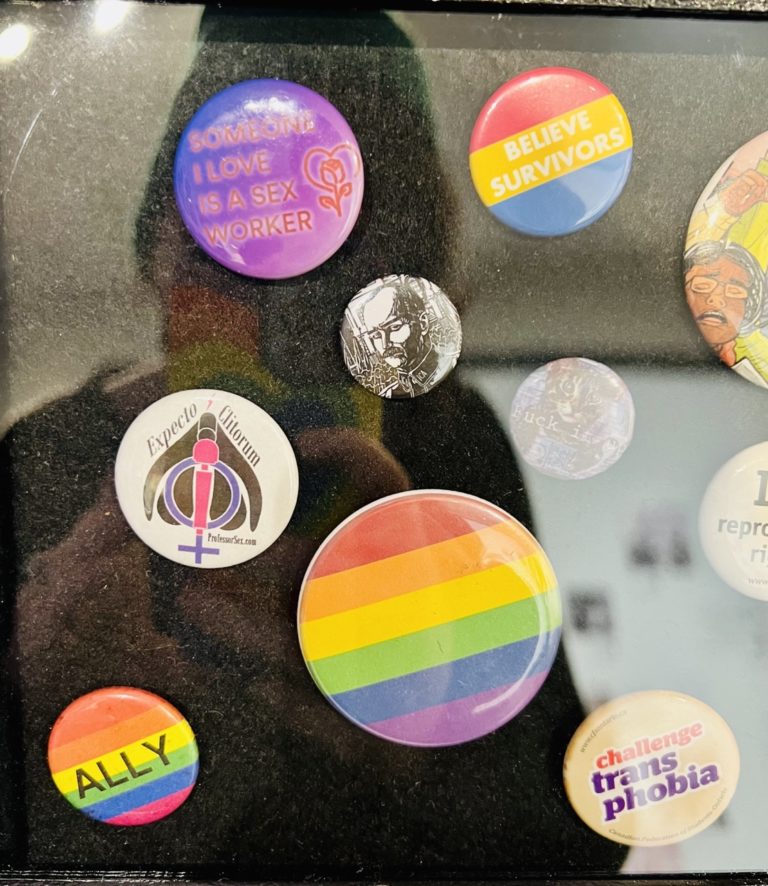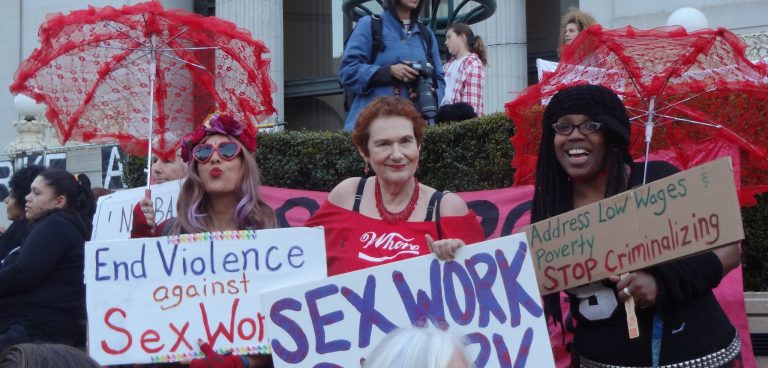
What with increasingly puritanical laws like SESTA/FOSTA jeopardizing the livelihoods of sex workers on a daily basis, there’s a lot of discourse these past few years about the validity of sex work as a profession. I think people on both sides are arguing with (what they think are) good intentions, but one side is just flat-out wrong.
See, one of the primary arguments against sex work is that it’s inherently exploitative and bad for society because “selling your body” is somehow more evil, less virtuous, and less valid than other types of work. Critics often make the case that someone can’t freely enter into sex work and agree to “defile” their body in that way because there are inherently a lot of financial (and sometimes social) pressures that push them into that work.
The thing is, a lot of these anti-sex work bigots (or SWERFs – sex worker-exclusionary radical feminists) are either operating from a deeply religious and archaic ideological framework, or don’t even realize how much Christian values have seeped into their thinking. I know this because they hold sex to a different standard than any other activity one might be paid to do, and there’s no reason it needs to be viewed that away aside from the fundamentally Christian belief that sex is somehow simultaneously sacred and special, and taboo and dirty.
If making money using one’s body is what you have an issue with, you’d need to be equally angry with athletes, actors, dancers, personal trainers, lifeguards, models, etc. etc. in order for that position to be ideologically consistent. If you consider “taking something into your body” to be an act so sacred that no one can willingly do it for a living, you should be yelling at food critics and circus fire-eaters too. If you think “inserting part of yourself into someone else’s body” isn’t valid work, why aren’t you harassing surgeons? If touching someone for the purposes of pleasure and relaxation crosses a line for you, why aren’t you mad at masseuses, acupressure specialists, and manicurists?
Some of these examples are a bit ridiculous, sure – but that’s because the arguments they’re refuting are ridiculous too. For me, the wildest thing about anti-sex work criticism is that it points out some of capitalism’s fatal flaws, but rarely goes so far as to actually criticize capitalism – largely because many such critics are well-off, conservative-leaning people who benefit from, and advocate for, capitalism’s deepest inequalities. These people will say that no one can truly consent to a job they take due to financial pressures, that sex work is inherently bad because it’s exploitative and can be dangerous, that it’s gross that someone can pay to access someone else’s body – but all of these are problems with capitalism itself, and not with sex work in particular. If you truly believe financial pressures should be eliminated so everyone can make free choices about what they do with their time, advocate for socialism and a universal basic income. If you think no one should be subject to exploitation and danger at their job, advocate for better worker protections and higher pay. If you think having a lot of money shouldn’t give someone control over other people’s bodies, maybe take that up with Jeff Bezos, for starters.
Humans are prone to trying to come up with “logical” explanations for feelings we hold deep in our gut – and far too often it’s immoral, insulting, dishonest, and ineffective. It’s the reason bigots argue that queer and trans people are the downfall of society, when they actually just think queer and trans people are icky. It’s the reason some racists will argue that they have valid reasons for their prejudices, when actually they’re just propagating the racist values they were raised with and chose not to challenge. And it’s the reason lobbyists and lawmakers would rather make sex workers’ lives harder and more dangerous by, say, banning online sex work platforms, like the Craigslist personals section, Backpage, and escortsliaison.com on the basis of “protecting vulnerable people,” rather than admit that those people either need a different kind of help or don’t need “help” at all.
I’ve only dabbled in some forms of sex work, but even I have encountered these shaming narratives, so I know that people more entrenched in the field are struggling and suffering needlessly under the oppressive weight of discrimination. Sex work is work, and as with all other kinds of work, it can only be done safely if there are proper protections in place for workers, which in this case includes having access to websites that allow them to find and screen clients. And as with all other kinds of work, sometimes it’s freely chosen and sometimes it’s chosen out of financial necessity, and neither is more valid than the other, since we live in a capitalistic system and financial pressures are built into our daily lives by design. If your issue is the danger, take it up with the conservative lawmakers making sex work more dangerous. If your issue is financial hardship, take it up with the conservative lawmakers creating those conditions. And if your issue is just that you think sex work is icky, take it up with your therapist, and leave sex workers the hell out of it.
If you want to help sex workers, consider donating to sex workers’ rights organizations like SWOP Behind Bars and Red Light Legal, advocating for sex workers’ rights to your local politicians/lawmakers, and even just donating directly to individual sex workers. This post contains a sponsored link; as always, all writing and opinions are my own.
 I was interested in fashion from a young age, and so I started reading fashion magazines in my early teens or perhaps even before that. There’s a lot of positive stuff I took away from those mags – including the overall sense of feeling justified in caring about clothes, because so many other people evidently did too – but I think that consuming that type of media at such a young age also kicked off a lot of insecurities for me.
I was interested in fashion from a young age, and so I started reading fashion magazines in my early teens or perhaps even before that. There’s a lot of positive stuff I took away from those mags – including the overall sense of feeling justified in caring about clothes, because so many other people evidently did too – but I think that consuming that type of media at such a young age also kicked off a lot of insecurities for me.
